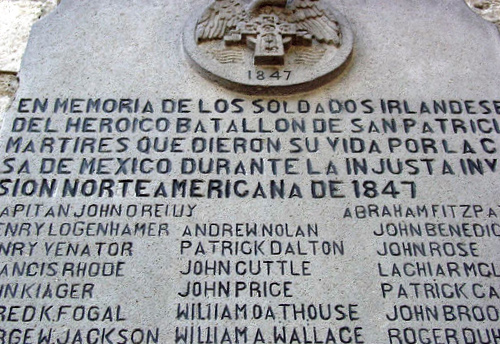This was originally published on PAOO on 3/8/10

It started when I was trying to figure out why I found Avatar so upsetting. It happens that I have no central vision in my left eye. Besides making it difficult to parallel park and hammer nails the lack of natural depth perception made the visual effects somewhat less stunning. Also, the colors and odd creatures are not quite as amazing to those of us who have labored long in Azeroth leveling our own avatars. So I paid a little more attention to the plot.
Talk about heavy-handed. Bad military. Bad businessman. Mercenary very very double plus ungood – bad bad. Nice scientists. Wonderful wonderful indigenous peoples – especially female ones. Dances With Wolves meets Apocalypse Now.
I realized that what was bothering me was the Mexican War. My friend Jonathan and I are working on a film that will focus on Margaret Fuller. All my reading is focusing on the project now. It happens that I’m in New York with her reading her articles in Greeley’s paper, the New York Tribune. (I keep wanting to call it the Herald because I fondly remember the Herald Tribune. My father would bring it home from work and we would read Art Buchwald.). (I’m not literally in New York now you understand. That’s where Margaret is. Or rather was in 1844 – 1846.)
The Mexican War was her generation’s Vietnam. Only it didn’t last as long. And there wasn’t a draft. And what was probably the worst part for her generation was that the United States won that war. It wasn’t just proto-hippy Henry David Thoreau and his ilk that were against the war –
“Generally the officers of the army were indifferent whether the annexation was consummated or not; but not so all of them. For myself, I was bitterly opposed to the measure, and to this day regard the war, which resulted, as one of the most unjust ever waged by a stronger against a weaker nation. It was an instance of a republic following the bad example of European monarchies, in not considering justice in their desire to acquire additional territory.”
Although he quit the Army in 1854, possibly under questionable circumstances, the above officer, known to have a serious drinking problem, had no cause to complain about his career. He was the first US Army officer to be awarded a fourth star and he went on from there to be president.
To compound my problem with all this, when I was watching Avalon I happened to be in Arizona. And I didn’t have my passport with me. So an alternate ending to the Mexican War might have put me in tough circumstances.
By some quirky coincidence, I finally stumbled on a movie that I had long wanted to see. One Man’s Hero. One Man’s Hero is about the San Patricios. The San Patricios were a battalion in the Mexican Army that contained numerous deserters from the US Army, most of whom were Irish. There was a mixture of motives including shabby treatment of Catholics by the US Army. I was extremely distressed to find that One Man’s Hero had exactly the same plot as Avatar – except for the wonderful indigenous people losing the war. There was the same romantic triangle and – spoiler alert – after surviving his fifty lashes and being branded with a D the hero manages to hook up with the woman who saved his life and embodied Mexico for him.
Nonetheless, it is comforting that if I really do slip into that alternate reality where Arizona is still part of Mexico it will be peopled by an alliance of Irish Catholics and Unitarian abolitionists and I’ll feel right at home.































































































